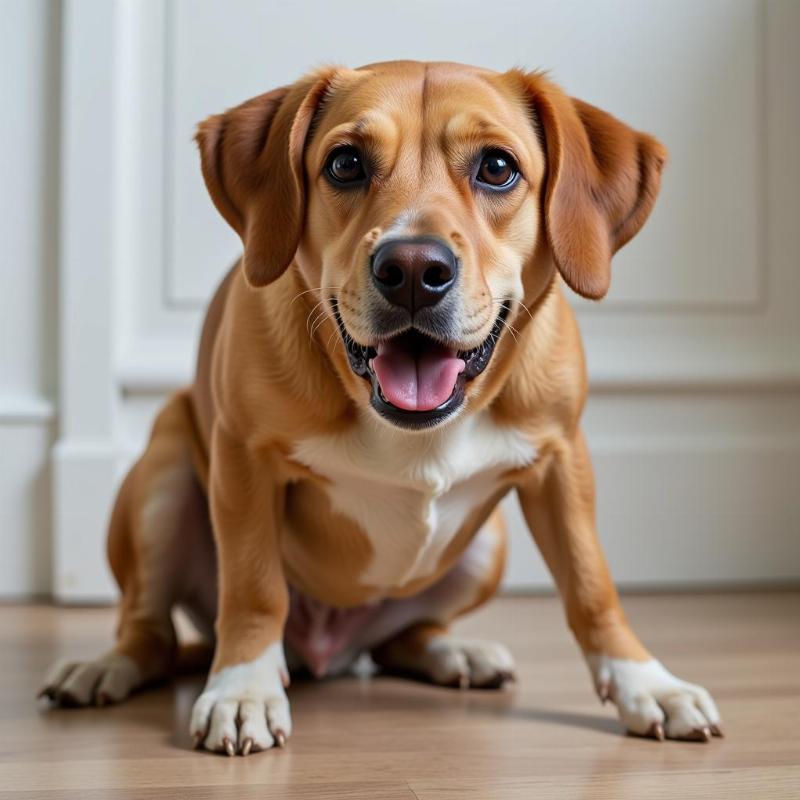After surgery, it’s common for dogs to experience a temporary change in their bowel habits, including difficulty pooping. This can be concerning for owners, but understanding the reasons behind this issue and knowing when to seek veterinary help is crucial. This comprehensive guide will address everything you need to know about your dog not pooping after surgery.
Why Isn’t My Dog Pooping After Surgery?
Several factors can contribute to postoperative constipation in dogs. Anesthesia, pain medications, and decreased activity levels can all slow down the digestive system. Surgical procedures, especially abdominal ones, can also directly impact bowel function. Changes in diet and stress can further exacerbate the issue.
How Long Is It Normal for a Dog to Not Poop After Surgery?
While some dogs may resume normal bowel movements within a day or two, others might take a bit longer. Generally, it’s considered normal for a dog to not poop for up to 72 hours after surgery. However, if your dog hasn’t pooped within three days and shows signs of discomfort, it’s essential to contact your veterinarian.
Signs of Post-Surgical Constipation in Dogs
Recognizing the signs of constipation is vital for prompt intervention. These signs may include straining to defecate, producing small, hard stools, loss of appetite, lethargy, vomiting, and abdominal distension. If your dog displays any of these symptoms, consult your veterinarian immediately.
 A dog straining to defecate, a common sign of constipation.
A dog straining to defecate, a common sign of constipation.
What Can I Do to Help My Dog Poop After Surgery?
Your veterinarian can recommend specific treatments for your dog’s constipation, such as stool softeners, laxatives, or enemas. Never administer any medication without your veterinarian’s approval. Alongside veterinary treatment, you can implement some at-home strategies:
- Increased hydration: Ensure your dog has access to fresh water at all times.
- Encouraging activity: Short, gentle walks can stimulate bowel movements.
- Dietary adjustments: Adding canned pumpkin or fiber supplements to your dog’s food, after consulting with your veterinarian, can help regulate their bowels.
When Should I Contact My Veterinarian?
Contact your veterinarian if your dog hasn’t pooped within three days of surgery or shows any signs of distress. Prompt veterinary attention is crucial to prevent complications and ensure a comfortable recovery.
Preventing Post-Surgical Constipation
While not all cases of post-surgical constipation are preventable, certain measures can reduce the risk. Discuss pre- and post-operative dietary management with your veterinarian. Ensuring your dog is adequately hydrated and maintaining a moderate activity level as recommended by your veterinarian can also be beneficial.
Conclusion
Post-surgical constipation in dogs is a common occurrence. Understanding the causes, recognizing the symptoms, and implementing appropriate measures can help alleviate your dog’s discomfort and promote a smooth recovery. Always consult with your veterinarian for guidance on managing your dog’s specific situation, especially if they are not pooping after surgery.
FAQ
- How long can a dog go without pooping after surgery? While up to 72 hours is generally considered normal, contact your veterinarian if your dog hasn’t pooped within three days or shows signs of discomfort.
- What are the signs of constipation in dogs? Straining to defecate, small, hard stools, loss of appetite, lethargy, vomiting, and abdominal distension are common signs.
- What can I do at home to help my dog poop? Ensure adequate hydration, encourage gentle exercise, and consider dietary adjustments like canned pumpkin or fiber supplements, but only after consulting with your veterinarian.
- When should I call the vet? If your dog hasn’t pooped within 72 hours post-surgery, or if they are exhibiting signs of distress or discomfort.
- Can post-surgical constipation be prevented? While not always preventable, proper hydration, controlled activity levels, and dietary adjustments discussed with your veterinarian can help minimize the risk.
- Are there medications that can help my dog poop? Yes, your veterinarian can prescribe medications like stool softeners or laxatives to help relieve constipation.
- Is it normal for my dog to be lethargic after surgery? Some lethargy is normal after surgery, but if combined with other symptoms like constipation, it warrants a call to your veterinarian.
Beautdogs.us is your trusted source for comprehensive dog care information, breed expertise, and top-quality products. We cater to both new and experienced dog owners, providing valuable resources and guidance. For personalized advice and expert insights, contact us at [email protected] or call us at +1 501-555-7529. Beautdogs.us is committed to helping you provide the best possible care for your furry friend.